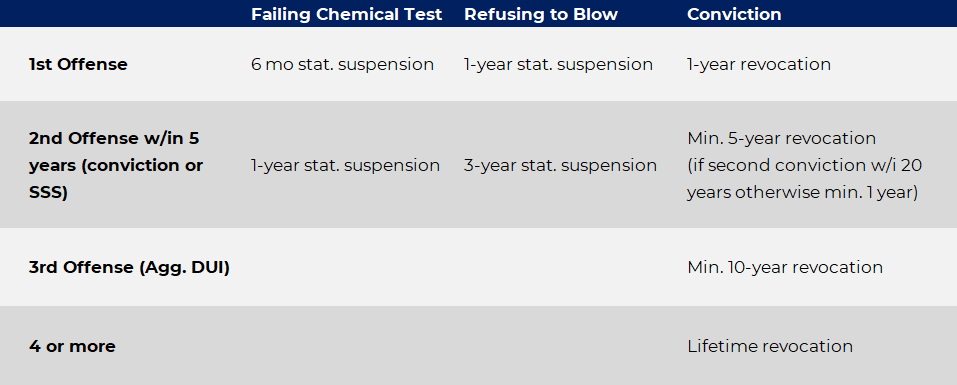
If you’ve been arrested for a DUI in Illinois, your driver’s license is in the process of being revoked. It’s crucial to contact an attorney right away. Being arrested for a DUI can result in a conviction which will be on your permanent driving record. In order to help fight a DUI arrest, it is important to call an attorney as soon as possible. Shifrin Law Group is experienced in handling DUI cases and can help you fight it.
In Illinois, when you are arrested for a DUI, you will be given a notice that your license is suspended. The suspension takes effect 46 days after your arrest. You will also be given a notice of when you must appear in court for your first hearing. It is crucial to contact an attorney immediately after you are arrested for a DUI, and it is even more vital to have an attorney with you during your first court appearance.
Court Proceedings
After being arrested for a DUI, you have 90 days to petition the court for a hearing to rescind the suspension of your license. This type of hearing is a civil hearing, independent from the criminal DUI charge, called Petition to Rescind the Statutory Summary Suspension. An attorney only has 90 days to file this petition, so it is crucial you contact an attorney immediately after your DUI arrest. When this petition is filed, the court must hear the matter within 30 days of filing. If the court grants your petition, you will still be able to drive while you fight your DUI charge. At the Statutory Suspension hearing, there are 5 main issues that can be raised:
- Whether the person was properly placed under arrest for driving under the influence
- Whether the officer had reasonable grounds to believe the driver was under the influence
- Whether officers adequately provided the driver with the ‘Warning to Motorist’
- Whether, after being advised of the consequences, the person refused to submit to breathalyzer testing
- Whether, if the person submitted to a breathalyzer test, the breathalyzer revealed an alcohol content of .08 or more
During your first criminal court appearance, your attorney will request a copy of all discovery materials from your DUI arrest. This includes the police report, your alcohol and drug influence report, the warning to motorist, a copy of your ticket, and footage from your arrest. It is crucial to have an experienced DUI attorney to ensure the discovery process and further court proceeding go smoothly. A majority of police departments in Illinois only keep body-worn footage and in-car camera footage for a period of 90 days. Ensuring that you receive the relevant footage before it’s purged gives you more opportunities to fight your DUI charge. The attorneys at Shifrin Law Group will fight to make sure you have the best chance you can possibly get in order to fight your DUI charge.
In Illinois, the Law Enforcement Officer-Worn Body Camera Act requires all law enforcement agencies to have body-worn cameras. The timing of implementing officer-worn body cameras depends on the population size of the municipality and county. For example, for municipalities and counties with a population of 500,000 or more, like the City of Chicago, body cameras must be implemented for all law enforcement officers by January 1, 2022. For municipalities and counties with a population between 100,000 and 500,000, body cameras are scheduled to be implemented by January 1, 2023. For the complete breakdown, see 50 ILCS 706/10-15(b).
In addition, Illinois State Police vehicles are required to have squad car or in-car cameras. Unlike body-worn cameras, in-car cameras aren’t mandated throughout the state of Illinois. However, the Law Enforcement Camera Grant Act provides grants to local Illinois government for the purpose of purchasing in-car video camera in law enforcement vehicles, purchasing body-worn cameras and law enforcement training on operating the cameras. Any police agencies that are given this grant are required to have in-car cameras in their police vehicles.
DUI Chart

A driver who has a previous statutory summary suspension/revocation from Illinois, a suspension for refusing a chemical test from another state, court supervision for DUI or a conviction for DUI within the last five years is considered a second offender and will have his/her driving privileges suspended for three years for refusal of chemical testing or one year for failure of chemical testing
A third offense refusal to submit to a chemical test will result in a 3-year suspension of your driver’s license.
For failing chemical test – Second or subsequent offense within five years—Suspension of driving privileges for one year with no eligibility for an MDDP.
For refusing – Second or subsequent offense within five years—Suspension of driving privileges for three years with no MDDP
Being charged with a DUI can be an incredibly stressful experience. Shifrin Law Group is here to help. We know the law, we know the local courts, and we know how to help our clients reach favorable outcomes.
Reach Out To Our DUI Defense Team Today For A Fast Response
Contact our team immediately and our experienced attorneys will provide you with a free consultation. Because our founding attorney speaks fluent Russian, we can provide service to you in the English or Russian language. Call 312-766-4223 or connect online by using our request form.
DUI FAQs
This is my first DUI, what happens now?
- If chemical testing reveals that you are legally under the influence, you are at risk for a suspension of your driving privileges for six months.
- A DUI in Illinois is a Class A misdemeanor if this is your first offense. If you are convicted of a DUI, your driving privileges will be revoked for a minimum of one year.
This is not my first DUI, what are my options?
- If chemical testing reveals that you are legally under the influence, you are at risk for a suspension of your driving privileges for six months.
- If this is your second conviction for a DUI, it is still a Class A misdemeanor, but this conviction carries a mandatory minimum imprisonment of 5 days or a sentence of 240 hours of community service. Your driving privileges will be suspended for a minimum of five years if this is your second conviction within 20 years.
Can I drive after I’m arrested for a DUI?
- Presuming you have a valid driver’s license, you are still able to drive during the 46-day period between your arrest and your statutory suspension hearing.
When can I get my license back?
- See the above chart
When is a DUI a felony?
- Any DUI offense that results in a felony charge is considered an Aggravated DUI. You will be charged with an aggravated DUI under several difference circumstances. Some of these include:
- This is your third or subsequent DUI;
- DUI committed while driving a school bus carrying one or more persons 18 or younger;
- DUI resulting in great bodily harm or permanent disability or disfigurement;
- This is your second or subsequent DUI committed while transporting a child under the age of 16
- DUI resulted in a crash, committed while transporting a child under the age of 16, and resulted in bodily harm to the child;
- DUI committed without a valid driver’s license or vehicle liability insurance;
- DUI committed in a school zone with restricted speed limit and crash resulted in bodily harm;
- DUI resulted in death.
Am I going to jail?
- Although jail time is a possibility, if you are a first-time offender it is unlikely you will have to spend time in jail
Do I have to provide a breath, blood or urine sample to the police?
- In Illinois, there’s an Implied Consent Law that basically states that if you’re in actual physical control of a vehicle in Illinois, you are deemed to have implicitly given consent to chemical testing of your breath, blood or urine. A police officer needs to establish that they have probable cause that you are driving under the influence and you are either being arrested for a DUI or were involved in a car accident with injuries or fatalities.
- If an officer pulls you over on a suspected DUI and you’re asked to blow in a breathalyzer, you have a right to refuse to do so. However, your refusal results in an automatic statutory summary suspension, meaning your license will automatically be suspended.
How long will my license be suspended if I refuse to submit to chemical testing?
- It depends. If you don’t have a prior DUI conviction or a statutory summary suspension in the previous five years, your license will be suspended for one year. However, if you do have a previous DUI conviction or a statutory summary suspension within the previous five years, your license will be suspended for three years. See above chart for more details.
What if someone was injured in an accident and I was driving?
- If a person suffers serious bodily injury or death resulting in your DUI, you will be charged with a felony DUI and may face harsh penalties if found guilty.
- If your crash resulted in serious bodily injury, you will be charged with a class 4 felony and can potentially face:
- Revocation of your driver’s license for at least 2 years
- Fines facing up to $25,000
- Possible prison time for 1-12 years
- If your crash resulted in a death, you will be charged with a class 2 felony and can potentially face:
- Fines facing up to $25,000
- Possible prison time for 3-14 years
- If your crash resulted in multiple deaths, you will be charged with a class 2 felony and can potentially face:
- Fines facing up to $25,000
- Possible prison time for 6-28 years
What options do I have if this is not my first driving under the influence offense?
- If this is your second DUI offense within five years, and you submit to chemical testing, your license will be suspended for 12 months. If you refuse to submit to chemical testing however, your license will be suspended for 3 years.
What penalties do I face?
- A misdemeanor DUI can hold fines anywhere from $500 – $3,000. Depending on the circumstances of your arrest your license will be suspended. If you consent to the breathalyzer test, your license will be suspended for 6 months. If you refuse to submit to a breathalyzer test, your license will be suspended for 12 months. The suspension will be effective 46 days after your citation for a DUI.
- Your DUI can be upgraded to a felony DUI charge if you committed a DUI when your license was revoked or suspended from a previous DUI charge, if you have two or more DUI convictions on your record, or serious bodily injuries or death occurred due to your DUI.
Can I refuse a blood test?
- First of all, it is important to know that in Illinois, the act of driving implies consent to testing, and the refusal to submit to these tests results in an automatic suspension of your driver’s license. That being said, you can decide to refuse submitting to testing, but the consequences of refusing may be more severe depending on your BAC.
If I am pulled over for a suspected DUI, what tests will officers use to determine intoxication?
- If you are stopped on the suspicion of driving under the influence, the officers will most likely ask you to perform one if not all of the following tests:
- The Horizontal Gaze Nystagmus test, where an officer has you follow a pen or a light with your eyes.
- The walk and turn test
- The one-leg stand test
- Blowing into a portable breathalyzer, which will measure your blood alcohol level
What happens if I get arrested for a DUI?
- In Illinois, if you get arrested for a DUI, the process of revoking your driver’s license has already begun. It’s essential you contact an attorney right away.

